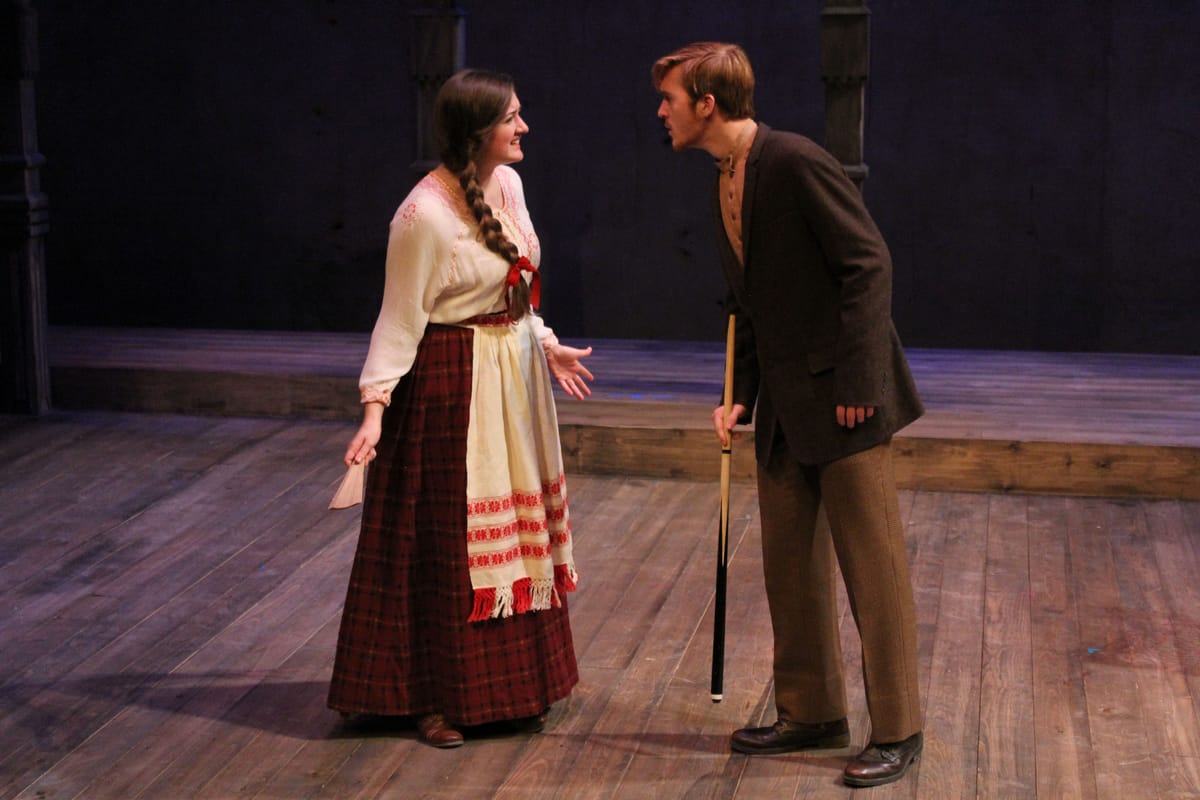Contradictions and Solutions: Kissinger ’19 on Directing a One-Act

Ben Kissinger ’19 is directing a one-act play for his directing studio class with Ronald Bashford, who he worked under last year in his first production, “The Cherry Orchard.”
Q: How did you come to directing and theater? Do you do other arts?
A: I’ve loved musicals ever since I was in pre-school, when my grandmother showed me Meredith Willson’s “The Music Man” with Robert Preston and Shirley Jones. I remember breaking sticks and pretending to conduct a band in the closing scene. Skip forward to college, I had no interest in focusing on anything other than math. My first-year seminar professor (Ronald Bashford) recruited me for “The Cherry Orchard” after seeing a silly skit where I gender-bended. I was hooked, and Ron is all to blame. He’s shown me a side of myself and the world I never would have dreamt of. Since then, I have been involved in seven department shows and countless other performances of song, dance and acting.
Q: How does it feel directing your peers? Does it come naturally, or is it uncomfortable?
A: Both of my actors are seniors. I’m a sophomore, and somehow they haven’t figured out that I don’t really know what I’m doing. All I have is my experience with phenomenal directors and dissuasions with Ron about what it takes to direct, but doing it yourself is an entirely new and frightening experience. Other than feeling uncomfortable here and there that they will figure out I’m a fraud, it isn’t strange at all to direct my peers. In no way am I telling them what to do or superior to them. In the process we all have an equally important weight in bringing the text to life; we simply have different perspectives. They’re in the trenches dealing with character motivations and dramatic action, and I’m a glorified audience member who is responsible for paying attention. When we pause, we take a second to talk it over and clarify things together. I can’t simply make decisions and tell them what to do. If I have a vision, I have to get them on board. Otherwise it’s not going to work.
Q: What skills do you think it requires?
A: Listening. The most important skill a director has is presence. Every time a director watches rehearsal, they have to watch as if they haven’t ever seen that particular scene before. A director must also be present with the actors as people, so that they can meet the actors where they are at. I can’t even count the times that, as an actor, I have run out of the rehearsal in tears. This can be due to catharsis from the text, a failure to accomplish a dramatic task, etc. The director should notice these states of being, respect and understand them and provide individual directions. Sometimes an actor stuck on a scene needs to understand what the character wants, sometimes they need to understand the text vocally and sometimes they need a quirky theater game that you just make up on the spot.
Q: What play are you directing? How and why did you choose it?
A: I’m directing “The Plumber’s Apprentice.” It’s a little unknown play by Mark Stein. The title stood out to me, so I grabbed it from the library. In reading it, I realized that the author managed to write living, breathing craftsman like I have known them. My stepfather is a maintenance director, and Mark Stein has managed to imitate his quirks and speaking rhythm to a tee. The play also touches on toxic masculinity in the workplace, a topic I have become very interested in since working on Lauren Carter’s senior thesis, “Big Love.”
Q: How do you think about adapting a work for this environment and audience?
A: The play is about a woman named Sally trying to make her way into a male-dominated field. She’s set to work with Rog, a quiet, misogynistic, washed out man in his 40’s. By the end of the play, something almost impossible happens — Rog has a change of heart. I live in a nation with a lot of bigoted people and some of them are in my family, some of them I love. How do you change someone’s heart? How can you make the people around you a little less shitty? It’s important to me to choose works that are relevant socially and politically, and then as a director I can make these things strange to emphasize contradictions and maybe even pose solutions.
Q: What role do you think theater plays on campus? What do you think we can do about having more art at Amherst?
A: I believe in a theater Bertolt Brecht envisioned: A social event where the community can sit back with a smoke and critically analyze the world they are watching as well as the world they are in. I’m no advocate for smoking, but I do think the theater should be a place of relaxation as well as a catalyst for change. As a performer, the theater can be a space of focus. It can be a place where someone takes a moment to really listen to their body and other people. It’s the best form of self-care I know of.
It doesn’t take a lot to create something. At the very least, you need a group of people willing to collaborate and a space to do it in. Often, I’ll be with a few of my friends in a studio, and we’ll end up making something really beautiful and powerful. Of course, this presupposes that we have the time to spare. Most students are swamped with tons of classwork, extracurriculars and favors. All of these things are great, but tend to cause unhealthy amounts of stress and fatigue. Setting boundaries can free up time and lead to moments of reflection, play and performance.





Comments ()